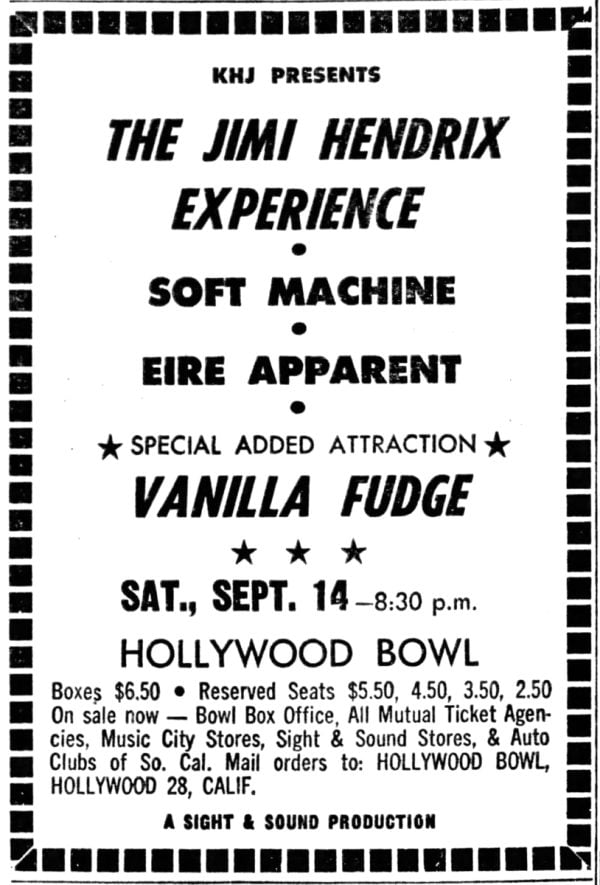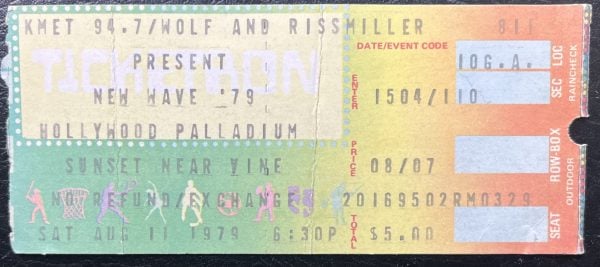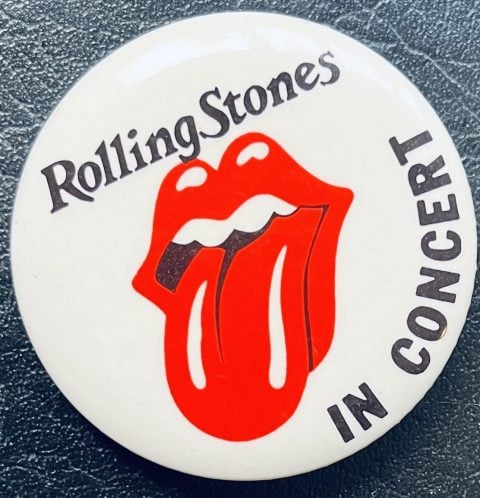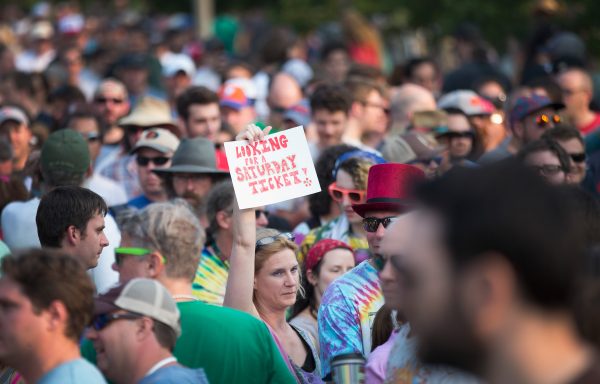Editor’s be aware: Dwell Nation / Ticketmaster, a dominant power within the stay live performance market, from venues to promotion to ticketing, was sued on antitrust grounds by the U.S. Division of Justice in Might. Lengthy-simmering anti-Ticketmaster sentiment crested with a serious fiasco throughout presale for Taylor Swift’s Eras Tour in 2022, resulting in a congressional scolding and, lastly, the present DOJ motion, which has not but been resolved. We requested longtime music author and historian Jim Washburn to provide an account of what ticket-buying was like earlier than Ticketmaster, and earlier than the web.
“Good afternoon, younger man. Might I enable you?”
“Sure, thanks, ma’am. I’d like six peanut clusters and two Jimi Hendrix tickets, please.”
That 13-year-old younger man was me in 1968, and that’s just about what shopping for live performance tickets was like then. In Southern California, you’d both get your tickets from the occasion field workplace, or at a Mutual Ticket Company, which had retailers wherever they may put one: malls, Clifton’s Cafeterias, faculty campuses and all method of mom-and-pop outlets.
In my case, that was the See’s Sweet store at La Mirada Mall, the place I used to be often helped by a matronly girl together with her grey hair in a bun, who probably didn’t know Jimi Hendrix from Jiminy Cricket. You’d inform her the artist, date and venue. She’d name the Mutual Company’s Los Angeles headquarters to see what was out there, fill in ticket blanks along with your seat numbers and such, and also you’d pay the face worth of the ticket — $4.50 on this case — with no service cost.

The Mutual company had been round since at the least the Thirties, and it was nonetheless working fairly effectively within the late Sixties. However it was a quickly altering world. The primary live performance I purchased tickets for was Cream and Spirit on the Anaheim Conference Middle in March 1968. My stepdad thought “live performance” meant “society occasion,” and made me put on my J.C. Penney’s burgundy go well with with a clip-on tie, splendid apparel for those who take pleasure in having hippies giggle at you. Fortunately, Dad had relaxed his costume code by that summer season, after I was seated in a sweltering filth subject amid some 60,000 seemingly psychedelicized people on the Newport Pop Pageant, there to see Jefferson Airplane, the Grateful Lifeless, the Byrds and different rock avatars for $4.50.
The next 12 months’s Woodstock pageant and its subsequent movie had been a serious accelerant to the stay music scene, and to ticketing. When 1955’s “Blackboard Jungle” had opened with Invoice Haley’s “Rock Across the Clock” blaring from movie-house audio system, it was a clarion name for youths who’d been ready eternally for music they may name their very own. The Woodstock live performance movie was that on steroids, plus acid and weed. Its viewers had grown up seeing their heroes assassinated, their associates shipped house in physique baggage and fellow college students shot useless on faculty campuses for protesting. Now they’d music that spoke to and for them, delivered through the loudest rattling amplifiers anybody had ever heard.
Plenty of us thought the questing music of the Sixties would result in a utopian period of peace, love, flying vehicles and computer systems that might resolve any drawback. We settled for Ticketron.

The Ticketron period
Based underneath one other identify in 1966, and functioning fairly effectively by the Nineteen Seventies, Ticketron was the primary profitable computer-based ticketing system. There was definitely a necessity for it. As good as the parents fumbling with the telephones at Mutual companies had been, there was no means they may address the burgeoning crowds now in search of live performance tickets. Had you seen the Who in 1968, you’d have been amongst perhaps 1,500 hardcore followers, however by 1970, the Who had been taking part in in arenas and stadiums, typically to greater than 30,000 individuals.
Ticketron retailers had been most frequently present in upscale malls, such because the Broadway, Might Co. and Robinson’s, and customarily positioned deep within the shops’ customer support nook. Some had competent, skilled employees who had been delicate to music followers’ longing to get the great seats earlier than they had been snatched up at different retailers. However some workers appeared to enjoy irritating the rockers infesting their tony retailer: “I’ll be proper with you, pricey, as quickly as I’ve proven this couple our full array of gift-wrap paper.” In the meantime, complete sections of live performance seats would vanish.
That’s one motive why many followers selected to affix the road at a live performance venue’s field workplace, another excuse being the maybe mythic assumption that field workplaces had the very best tickets. However nobody shunned Ticketron to keep away from the service price — it was solely 25 cents — or the comfort price — since there wasn’t such a factor but.
Ticket costs, in the meantime, had solely moved up a buck or two within the early ’70s. Consequently, followers had been outraged in 1974 when costs for Bob Dylan and the Band’s enviornment tour had been jacked as much as $8 and $9.50. However what performers and promoters famous was that, outrage or not, each present offered out and scalpers had been getting document costs for tickets.
Scalpers enter the scene … and ticket costs rise
That was the primary spark igniting the fast and apparently endless climb in ticket costs. When scalpers began to get $200 or $300 for tickets with a $15 face worth, bands, promoters, venues and different stakeholders noticed that as cash that must be going into their pockets, not some scuzzball road vendor’s.
Consequently, deadpans longtime concert-goer Matt Rosney, “Not that a lot has modified, besides the decimal level. In 1975 I used to be paying $6.50 for a Stones’ ticket; now it’s $650 if I’m fortunate.”
I’m mixing some completely different voices into the story at this level, as a result of I grew to become a music critic in 1983 and for the following quarter-century scarcely ever needed to pay for the a whole bunch of live shows I noticed. Poor me. So I requested associates and Fb associates to weigh in with their experiences.
Philadelphia-raised Matt has seen the Rolling Stones in six completely different many years, starting when he was a younger teen in 1966: “I went with my mom and brother to Atlantic Metropolis. Whereas they shopped or one thing, I spent one greenback and three cents tax to see the Stones within the Marine Ballroom on Metal Pier. They solely performed six songs in a half-hour set, with the viewers screaming and going nuts, and I instructed myself, ‘I would like extra of this!’”
Matt hasn’t missed a Stones’ tour since, and as soon as managed to see 19 exhibits on a 25-city tour. For the band’s 1969 jaunt, he needed to drive to the place the distant exhibits had been a month early to attempt to purchase tickets. When the Stones subsequent toured, in 1972, Matt discovered that if he might get the Ticketron code numbers for his or her gigs in different cities, he might purchase the tickets proper from the Ticketron outlet in a Sears retailer in Philly.
The communal aspect of standing in line
Matt and several other others instructed me that one factor they miss about these days is that, alongside the competitors to get good tickets, there was additionally plenty of camaraderie. While you’re in a queue sharing a joint or bota bag of wine with individuals as nuts a couple of band as you’re, you typically kind lasting friendships. One in all Matt’s line-made friendships was with an enormous collector of Stones memorabilia, who in flip was associates with the band’s safety supervisor, who would typically get them into exhibits.
On the West Coast, Orange County teen Andrea Waters first noticed the Stones on the L.A. Discussion board in 1972, and the next 12 months spent an evening in a sleeping bag within the Discussion board’s car parking zone to get tickets for a profit live performance the Stones headlined. (She was amazed when famed live performance promoter Invoice Graham himself handed out the ticket slips within the morning.)

Like Matt, Andrea hasn’t missed a Stones tour since then. Typically the ticketing was completed by mail order, and — taking a tip from a buddy who’d mail in for TV recreation present prizes — she used colourful, hand-decorated envelopes labeled “Choose Me!” However it was Ticketron, after which Ticketmaster, retailers she needed to take care of for many of the rock live shows she attended.
“That concerned operating at full velocity by the native Broadway or Might Firm to the ground with the ticket counter,” she recollects. “They frowned on operating, however that by no means stopped us. As soon as there, my buddy Mike and I often introduced a clipboard with a sign-up sheet — like we had been officers — so individuals wouldn’t attempt to leap their place in line.
“In contrast to the previous girls on the Might Firm, on the Tower Information shops the Ticketron, and later Ticketmaster, crews actually knew what they had been doing. The issue was everybody knew that, and there’d be 100 or extra individuals lining up at Tower earlier than they opened, so your probabilities could possibly be dim there, too. We lucked out, for some time, once we discovered a Ticketmaster outlet in an out-of-the-way stationary retailer. After all, individuals came upon about that earlier than lengthy.”
When the Stones toured the U.S. in 1978, Andrea and a few associates took to the highway to catch a number of of the exhibits, and made some far-flung new associates within the queues. Matt Rosney was nonetheless doing the identical, and on the Stones’ Cleveland present that 12 months the 2 met and clicked. After clicking much more once they each turned up at subsequent exhibits in varied states, Matt ultimately moved west, and Andrea grew to become a Rosney once they married in 1983. Forty-one years later, they’re nonetheless hitched, are grandparents, and nonetheless joined within the ticket scramble on the Stones’ present tour.
Ticketmaster, earlier than the web
These digital days, it’s not solely shocking that a variety of individuals I spoke with check with the Line Nation-aligned Ticketmaster as Ticketbastard. However again within the service’s brick-and-mortar heyday, lots of people on the enterprise aspect of the counter did their finest to make it work for ticket consumers. Lorraine Chambers, a author and editor on the Hollywood Occasions, was a part of the Ticketmaster crew on the Costa Mesa, California, Tower Information 20 years in the past.
She says, “We operated like an incredible meeting line, with a exactly delegated setup.” That entailed prepping the hopeful consumers in line exterior: issuing wristbands; pre-checking IDs; instructing consumers to have money and bank cards prepared reasonably than fishing them out on the counter; and requesting they be quiet inside, so everybody’s orders could possibly be heard clearly.
“Our aim was to maintain the Ticketmaster machine printing out essentially the most tickets attainable earlier than a present offered out,” Lorraine says. “The very last thing we needed to listen to was a purchaser moaning when that occurred.”
Getting artistic seeking tickets
I’ve heard a number of tales of different technique of moving into exhibits. One couple combined a gallon of screwdrivers in a plastic milk jug and traded it for tickets exterior a multi-act stadium live performance. One much less consumer-minded particular person offered rabbit droppings as cannabis exterior a Tom Verlaine present. In multiple occasion, individuals acquired to the entrance of a ticket line by carrying pizza containers and saying they had been making a supply to the field workplace.

After which there have been the Grateful Lifeless followers. In 1978, the Lifeless recorded a track referred to as “I Want a Miracle,” and it grew to become a mantra for followers who adopted the band from metropolis to metropolis however lacked tickets. Typically they’d discover somebody with spare tickets; typically a sympathetic stagehand would possibly slip them in a aspect door; however most frequently they’d discover a poorly guarded fence to scramble over by the handfuls.
That was at the least extra civilized than the heyday of rock festivals, when hordes would tear down parameter fences. As then-young concert-goer Mike Ritto put it, “Palm Springs Pop Pageant: no tickets; acquired in free when the fences got here down. Newport Pop Pageant ‘69, Devonshire Downs: no tickets; acquired in free when the fences got here down.”
Typically serendipity will get the job completed. When Leonard Cohen’s last tour made its approach to Seattle in 2013, my buddy Karl Zwick went to the theater ticketless as a result of he often lucked out shopping for last-minute unclaimed comp tickets from the field workplace. He had no such luck this time, and was even much less cheered when he noticed a lady merely give away her two spare tickets to a person with a laminated “I Want Tickets” signal hung from his neck. Karl acknowledged him as a scalper he’d seen exterior different exhibits. For the reason that fellow had paid nothing for the tickets, Karl provided him face worth, $50, for one, however he insisted on $100.
“Then a man who’d seen this got here as much as me a minute later and requested if I wanted a ticket,” Karl recollects. “I stated, ‘Hell sure,’ after which he quizzed me with questions like, ‘The place was Leonard born?’ ‘What’s the title of his second album?’ I assume I handed. He pulled a small stack of tickets from his pocket and handed me one.
“It turned out he was Leonard Cohen’s highway supervisor. He didn’t like scalpers, and instructed me in a not too threatening voice, ‘If it’s not you in that seat, I will discover you.’ And he did come out from backstage earlier than the present began, noticed me within the seat, shook my hand and stated, ‘You’re a person of honor.’ That’s one thing I’ve by no means heard from Dwell Nation.”
Ah sure, Dwell Nation. They don’t get, or give, a lot love. Matt and Andrea Rosney definitely don’t have any enjoyable navigating Dwell Nation’s Ticketmaster website. Matt doesn’t just like the surge pricing, the place a ticket’s price can out of the blue lurch upward primarily based on demand. He doesn’t just like the comfort price, so named as a result of you have got the comfort of shopping for tickets in your cellphone or house pc, with out Ticketmaster factoring the huge comfort it’s for them to not be paying for computer systems, printers, ticket inventory and folks in a zillion bodily areas.
And don’t even get Matt began on the service price. Oh, what the hell, let’s: “On my Stones ticket for Las Vegas, the service price alone was $110. What service did they supply? Nicely, it hurts after I sit down. That is the service they supplied.”
(Grateful Lifeless crowd photograph by Scott Olson/Getty Photographs)



